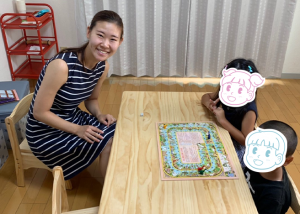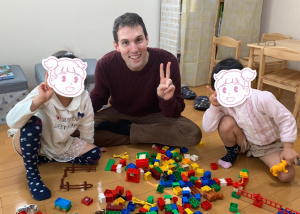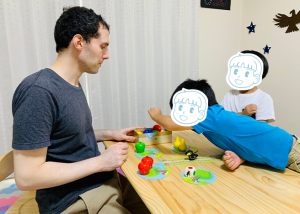Teaching Style
様々な研究によると、人々が専門家になるために少なくとも10,000時間が必要とされています。コミュニケーションは例外ではありません。コミュニケーションで情報を伝える為には基本的な情報に加え、様々な複雑で微妙な情報とニュアンスが必要です。言語を習得するには本当に一生かかるためできるだけ早く英語を学び始めることが彼らの成功につながります。
Many studies have shown that it takes 10,000 hours to become an expert at any skill. Communication is no different. There are lots of complexities that go along with communication, many subtleties, nuances. This is in addition to learning the fundamentals and the basic transfer of information. It truly takes a lifetime to master a language, so starting children as early as possible is crucial to their success.
 新しい言語を学ぶことは得に難しいです。一つの言語でスキルを伸ばし、文法のルールを学ぶとします。しかしそのスキルは別の言語で使えない場合があります。そのため新しい考え方をしなければなりません。この考え方を伸ばす最良の方法は、新しい言語で応用できるように実践的な経験を積むことです。
新しい言語を学ぶことは得に難しいです。一つの言語でスキルを伸ばし、文法のルールを学ぶとします。しかしそのスキルは別の言語で使えない場合があります。そのため新しい考え方をしなければなりません。この考え方を伸ばす最良の方法は、新しい言語で応用できるように実践的な経験を積むことです。
As we develop skills and learn the grammatical rules in one language, the same rules usually do not apply to the new language. We have to develop a different way of thinking. The best way to develop this way of thinking is to have practical experiences that teach how to think in the new language.
子供たちがクラスに慣れるように毎日同じルーティンをします。幼稚園児のクラスでは、快適に過ごせるように、そして英語の環境に落ち着くことができるように自由な遊びから始めます。子供たちは徐々に英語で話すことに対して慣れ始めます。英語の言葉を知らなかったら日本語で先生に伝え、その後英語でリピートします。このようにして使いたい言葉を学べます。
Each day, we follow the same routines so that the kids become familiar with the structure of the class. For preschool-aged kids, we start with a little free play so that they can feel comfortable and settled into the English environment. They begin to get used to talking about things they want to talk about in English. If they don’t know the English words they can say the words in Japanese and then repeat the same idea in English. This allows them to learn the vocabulary.
自由時間の後、挨拶をして天気の話をします。同じイメージを見たり同じ質問を聞いたり同じ返事したりします。毎日同じことをするため文法と言葉が記憶に残りやすいです。毎日同じルーティンをすることで、自然と答えれるようになり、それが子供たちの自信にも繋がります。
We then go into routines of greetings and weather. They see the same images and ask and answer the same questions. As they do the same things every class, this reinforces the same grammar and vocabulary to build into their long-term memory. It also gives them a comfortable routine and as they see they are learning, their confidence to speak English grows.
その後カードの授業が始まります。言葉6つを覚えます。時々新しい言葉を、時々復習をします。動きを加えたゲームで言葉を楽しく覚えます。覚えた後、新しい言葉と簡単な文章を練習します。動きを加えたゲームで文章を楽しく繰り返します。必要な質問を学んで、ゲームで質問を聞いて返事をします。

After that, we move into learning from vocabulary cards. They are asked to memorize six vocabulary words a lesson. Sometimes they are new and sometimes they are review words. We do fun moving games to add life to simple memorization. After they have mostly incorporated the new words into their vocabulary, they learn a simple sentence using that vocabulary. They repeat this sentence using their fun moving activities. Then they learn the question that elicits that response. To reinforce the usage of that question and answer, we play a game that lets the kids move around.
そして子どもの好きなゲームをします。ゲームを続けれるようにゲームで使うフレーズを学びます。例えば 『あなたの番。どうぞ。』簡単な表現にまず慣れ、次にもっと難しい言葉に変えていきます。例えば 『誰の番ですか? 私の番です。彼の番です。』など。子供たちが一つの文章を簡単に言えるようになったら、次に同じような表現方法を教え、少しずつ英語の能力を伸ばし、確かな文章を根付かせていきます。
We then play games and learn key phrases that help them move forward in the game. For example, they can say, “It’s your turn. Please roll.” As they become comfortable with the expression, they can answer the question, “Whose turn is it?” with “It’s my turn” or “It’s his turn.” We slowly expand on their English ability so that as certain sentences become easy to say and engrained in their knowledge, they work in new words and expressions to say similar ideas.
小さな子供たちにとって難しいことはリピートするべきなのか、返事をするべきなのかの決断です。そのため同じルーティンが大事なのです。私たちは最初の文章に慣れるまで、文章を変えません。例えば第1週目に『What do you want?』で質問した場合、第2週目には『What would you like?』と質問しません。意味は大体同じですが、混乱させたくないためです。質問をリピートすることなく、自分で返事できるまで同じ質問をします。
 One of the more difficult things for the younger students to understand is figuring out when it is appropriate to repeat the English being spoken to them and when they are being asked a question and should respond in English. This is when having set routines is very important. We also do not change the grammar until they are comfortable with the first grammar. For example, we would not ask them “What do you want?” one week and then “What would you like?” the second week. Although the meanings are functionally the same, it would confuse the student. We do the same questions until they are comfortable answering on their own without needing to repeat the response.
One of the more difficult things for the younger students to understand is figuring out when it is appropriate to repeat the English being spoken to them and when they are being asked a question and should respond in English. This is when having set routines is very important. We also do not change the grammar until they are comfortable with the first grammar. For example, we would not ask them “What do you want?” one week and then “What would you like?” the second week. Although the meanings are functionally the same, it would confuse the student. We do the same questions until they are comfortable answering on their own without needing to repeat the response.
本当に新しい言葉と文法に慣れるまで時間がかかります。一日一日と一月一月と学んだ事を復習をします。しかし英語を話すことを完全に内面化するには1万時間がかかります。それから子供たちに週に1時間以上、週何回も通わせることをおすすめします。
It takes time to truly feel comfortable with all of the new vocabulary and grammar, so we review the material from week to week and month to month. But it takes hours and hours of learning to completely internalize speaking in English. As a result, we promote having students stay in class for a longer period of time per lesson and we strongly encourage our students to come more than once a week.
